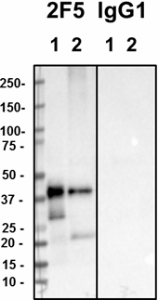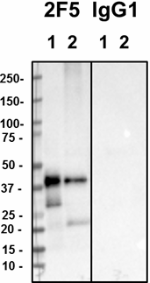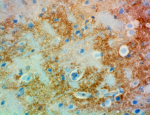- Clone
- 2F5 (See other available formats)
- Regulatory Status
- RUO
- Other Names
- GJA1, Cx43, Gap Junction Protein Alpha 1
- Isotype
- Mouse IgG1, κ
- Ave. Rating
- Submit a Review

| Cat # | Size | Price | Quantity Check Availability | Save | ||
|---|---|---|---|---|---|---|
| 850001 | 25 µg | £81 | ||||
| 850002 | 100 µg | £166 | ||||
Connexins are a family of transmembrane proteins that assemble to form vertebrate gap junctions, thus also called Gap Junction Proteins. So far, 21 Connexins have been discovered in humans. The gene GJA1 encodes Connexin 43 (Cx43), which is the most expressed Connexin, and can be found in many human tissues including skin, bone, and brain. Cx43 has been reported to be involved in synchronized contraction of the heart as well as embryonic development. Besides its functions as a channel protein, Cx43 also performs channel-independent functions. During brain and heart development, cytoplasmic Cx43 regulates the microtubule network and thus affects cell migration and polarity. In addition, mitochondrial GJA1 has also been reported to promote cell survival by down-regulating the intrinsic apoptotic pathway during conditions such as oxidative stress.
Product DetailsProduct Details
- Verified Reactivity
- Human, Mouse
- Antibody Type
- Monoclonal
- Host Species
- Mouse
- Immunogen
- KLH-conjugated peptide corresponding to amino acids 247-382 of Connexin 43
- Formulation
- Phosphate-buffered solution, pH 7.2, containing 0.09% sodium azide.
- Preparation
- The antibody was purified by affinity chromatography.
- Concentration
- 0.5 mg/ml
- Storage & Handling
- The antibody solution should be stored undiluted between 2°C and 8°C.
- Application
-
WB - Quality tested
IHC-P - Verified - Recommended Usage
-
Each lot of this antibody is quality control tested by Western blotting. For Western blotting, the suggested use of this reagent is 1 to 5 µg per ml. For immunohistochemical staining on formalin-fixed paraffin-embedded tissue sections, the suggested use of this reagent is 5 µg per ml. It is recommended that the reagent be titrated for optimal performance for each application.
- RRID
-
AB_2721730 (BioLegend Cat. No. 850001)
AB_2721730 (BioLegend Cat. No. 850002)
Antigen Details
- Structure
- Connexin 43 (GJA1) is a 382 amino acid protein with a molecular mass of 43 kD.
- Distribution
-
Tissue distribution: expressed in most tissues, enriched in brain, endocrine, muscle, bone marrow, immune System, ovaries, testes, and Skin.
Cellular distribution: plasma membrane, cytosol, mitochondria, golgi apparatus, cytoskeleton and endoplasmic reticulum membrane. - Function
- Connexin 43 plays a role in cell-to-cell communication by forming channels or gap junctions between cells. It allows for the transport of nutrients, charged particles (ions), and other small molecules that carry necessary communication signals between cells.
- Biology Area
- Cell Biology, Neuroscience, Neuroscience Cell Markers
- Antigen References
-
- Grek CL, et al. 2016. Cancer Lett. 374(1):117
- Lilly E, et al. 2016. Semin Cell Dev Biol. 50:4
- Michela P, et al. 2015. Eur J Pharmacol. 768:71
- Gene ID
- 2697 View all products for this Gene ID
- UniProt
- View information about Connexin 43 247-382 on UniProt.org
Related Pages & Pathways
Pages
Related FAQs
Other Formats
View All Connexin 43, 247-382 Reagents Request Custom Conjugation| Description | Clone | Applications |
|---|---|---|
| Purified anti-Connexin 43, 247-382 | 2F5 | WB,IHC-P |
Compare Data Across All Formats
This data display is provided for general comparisons between formats.
Your actual data may vary due to variations in samples, target cells, instruments and their settings, staining conditions, and other factors.
If you need assistance with selecting the best format contact our expert technical support team.
-
Purified anti-Connexin 43, 247-382

Western blot of anti-Connexin 43, 247-382 antibody (clone 2F... 
IHC staining of anti-Connexin 43, 247-382 antibody (clone 2F...


 Login / Register
Login / Register 













Follow Us